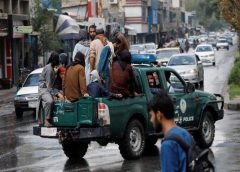
Human Rights Watch asks UN not to renew travel ban waiver on Taliban officials
[ad_1]
Amid the ongoing political isolation of Afghanistan due to their atrocities on women and young girls in the country, the Human Rights Watch has urged the United Nations Security Council (UNSC) not to extend the existing government officials’ travel exemption as a result of the closure of girls’ schools in Afghanistan. However, Taliban spokesperson Bilal Karimi has once again asked the UN to renew the travel ban imposed on the current government officials and warned that the sanctions will put Kabul further apart from the international community, according to TOLOnews.
“It is good that they should come together and bring the Islamic Emirate to the international level as a responsible and prominent system in the world. There should be an emphasis on adopting diplomatic means,” Karimi said. According to the analysts, one of the key reasons for not extending the travel exemption for officials of the Islamic Emirate is the failure of Taliban to implement the Doha Agreement.
“The Taliban group failed to uphold its obligations to the international community and the Afghan people, one of which is to respect Afghan citizens’ fundamental rights,” said Nematullah Bizhan, international relations expert. Human Rights Watch also urged the United Nations not to extend the existing government officials’ travel exemption and demanded for how they should be taking care of the intense women’s rights crisis in Afghanistan.
The Security Council should permanently end all exemptions to the travel bans that are covering and restricting some Taliban leaders. The Security Council should be looking to add more Taliban leaders to the list of people subject to travel bans and to add other measures and based on their involvement in human rights violations,” said the associate director of the women’s rights division at Human Rights Watch, Heather Barr. Meanwhile, the first deputy of the prime minister, Mullah Abdul Ghani Baradar, the second deputy Mullah Abdul Salam Hanafi, the political deputy of the prime minister Mawlawi Abdul Kabir, the acting minister of foreign affairs Amir Khan Muttaqi, the political deputy of the foreign ministry Sher Mohammad Abbas Stanekzai, the minister of mines and petroleum Shahabuddin Delawar, the intelligence director Abdulhaq Wasiq, minister of information and culture Khairullah Khairkhah, deputy minister defense Fazel Mazloum, minister of economy Din Mohammad Hanif, minister of Haj Noor Mohammad Saqib, minister of borders and tribes Noorullah Noori and minister of energy and water Latif Mansour are those whose travel ban exemption period has ended, and they cannot travel abroad.
Earlier, the UN Security Council (UNSC) gave leaders of the Islamic Emirate exemptions to travel bans to facilitate their negotiations with the US despite its long-standing international travel ban on the Taliban leaders. Moreover, in an earlier statement, HRW’s Barr said the Taliban rollback of the rights of women and girls began immediately after they took power on August 15, 2021.
“It has been 327 days now since the Taliban imposed a de facto ban on girls’ secondary education in Afghanistan. That’s 327 days of a nation’s girls being denied education–327 days they will never get back,” she said. “Their future has been curtailed dramatically by Taliban bans on women working in most professions and surveillance of women, restrictions on women’s movement, and workplace rules that have driven many women out of even those jobs that, on paper, they are permitted to do,” Barr said.
Since the Taliban seized power in Kabul last year, the human rights situation has been exacerbated by a nationwide economic, financial and humanitarian crisis of unprecedented scale.The Taliban dismantled the system to respond to gender-based violence, created new barriers to women accessing health care, blocked women’s aid workers from doing their jobs, and attacked women’s rights protesters. With the US troops’ withdrawal from the country, large-scale violence has been unleashed creating political uncertainty in different parts of the country. At least 59 per cent of the population is now in need of humanitarian assistance – an increase of 6 million people compared with the beginning of 2021, according to UNAMA. (ANI)
(This story has not been edited by Devdiscourse staff and is auto-generated from a syndicated feed.)
[ad_2]
Source link


